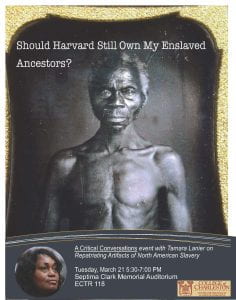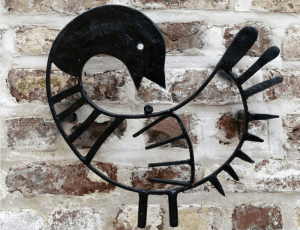April 27, 2 pm – 4 pm
Multicultural Center Lawn
College of Charleston
14 Green Way
Charleston, SC 29401

College of Charleston
14 Green Way
Charleston, SC 29401
Join the Latin American and Caribbean Studies Program in welcoming Kim Hass
Rita Hollings Science Center, Rm 101
College of Charleston
58 Coming Street, Charleston, SC 29401
Wednesday, April 19th
5:00 PM – 6:00 PM(ET)
Kim Haas is Executive Producer, Host and Creator of Afro-Latino Travels with Kim Haas, a travel show celebrating the African influence in Latin America. She has traveled extensively throughout Latin America. Kim has been active in Afro-Latino issues for more than a decade and is founder of losafrolatinos.com, a blog celebrating Afro Latino culture. Kim speaks fluent Spanish, Italian and Portuguese. Her undergraduate and graduate degrees are in Spanish. Kim is the owner of Haas Media LLC, a multilingual community outreach, translation services, and communications firm located in the greater New York City area.
 Septima Clark Auditorium (Room 118)
Septima Clark Auditorium (Room 118)
Thaddeus Street Jr. Education Center
25 St. Philip St, Charleston, SC 29401
Tuesday, March 28, 7:30 pm – 9:00 pm
The recently unveiled mural of Septima P. Clark in the Education Center at the College of Charleston will serve as a backdrop for a March 28 conversation on the civil rights icon’s life and legacy. A 7:30 p.m. panel discussion at the center will include five contributor
Ukweli, is the Swahili word for truth. The book follows a 2020 poetry-lecture series at McLeod Plantation organ
Brown is co-founder and project director of an oral history initiative to identify the “first children,
Savannah Frierson, a Ukweli contribut
Th
In addition to the Septima P. Clark mural, information panels in the Education Center present the periods of Clark’s life. Essays, interviews and a range of primary sources represent the online material the college has posted to tell Clark’s story as an educator and civil rights champion who Martin Luther King Jr. called the mother of the movement.
Thaddeus Street Jr. Education Center
Septima P. Clark Auditorium (Rm 118)
25 St. Philip Street, Charleston, SC
Tuesday, March 21, 2023
5:30PM – 7:00 PM(ET)
 The Center for the Study of Slavery in Charleston has invited Tamara Lanier to deliver a lecture about her enslaved ancesto
The Center for the Study of Slavery in Charleston has invited Tamara Lanier to deliver a lecture about her enslaved ancesto
The HistoryMakers is a unique collection of oral history videos that provides an unprecedented and irreplaceable record of African American lives, history, and culture. The collection includes over 12,000 hours of video oral history interviews covering a variety of topics and fields including the arts, business, civic engagement, education, entertainment, law, medicine, and much more. Learn more about The HistoryMakers here.
The Libraries’ Collection Development Committee values the input of the campus community when evaluating potential new resources to add to the collections. Please complete the Trial Evaluation Form and let us know what you think of The HistoryMakers.
Thursday, February 16th at 5 pm
Thaddeus Street Jr. Education Center * Septima Clark Auditorium
25 St. Philip Street, Room 118
origin story outlines a family history of distant sisters, grieving mothers and daughters, and alcoholic fathers. These poems take us from Kansas to Korea and back again in an attempt to reconnect with estranged family and familial ghosts divided by years of diaspora. An interrogation of cultural and personal myths, origin story wrestles with the questions: Who will remember us? How do we deal with the failures of memory? Whose stories are told?
Black southerners often shielded their loved ones from the most painful memories of local lynchings with strategic silences but also told lynching stories about vengeful ghosts or a wrathful God or the deathbed confessions of a lyncher tormented by his past. They protested lynching and its legacies through art and activism, and they mourned those lost to a mob’s fury. They infused a blues element into their lynching narratives to confront traumatic memories and keep the blues at bay, even if just for a spell. Telling their stories troubles the simplistic binary of resistance or submission that has tended to dominate narratives of Black life and reminds us that amid the utter devastation of lynching were glimmers of hope and an affirmation of life.
My Soul Is a Witness traces the long afterlife of lynching in the South through the traumatic memories it left in its wake. She unearths how African American victims and survivors found ways to live through and beyond the horrors of lynching, offering a theory of African American collective trauma and memory rooted in the ironic spirit of the blues sensibility—a spirit of misdirection and cunning that blends joy and pain.
 We’re excited to share with everyone the Fall 2022 AAST Newsletter! Check it out to see what’s happening in the program this semester.
We’re excited to share with everyone the Fall 2022 AAST Newsletter! Check it out to see what’s happening in the program this semester.
 We’re excited to share with everyone the Spring 2022 AAST Newsletter! Check it out to see what’s happening in the program this semester.
We’re excited to share with everyone the Spring 2022 AAST Newsletter! Check it out to see what’s happening in the program this semester.
Click the link below to listen to the 3rd episode of Port of Entry!
Episode 5 “The Issue of Females”
November 12, 2019
A lively conversation between Religious Studies scholars Matthew Cressler and our 2019-2020 Conseula Francis Emerging Scholar Lecturer Alexis Wells-Oghoghomeh, following her standing-room only talk on “’The Issue of Females’: Abortion, Infanticide, and Ethics in Southern Slavery.” Her research presented at CofC is drawn from her forthcoming book, tentatively titled The Souls of Womenfolk.